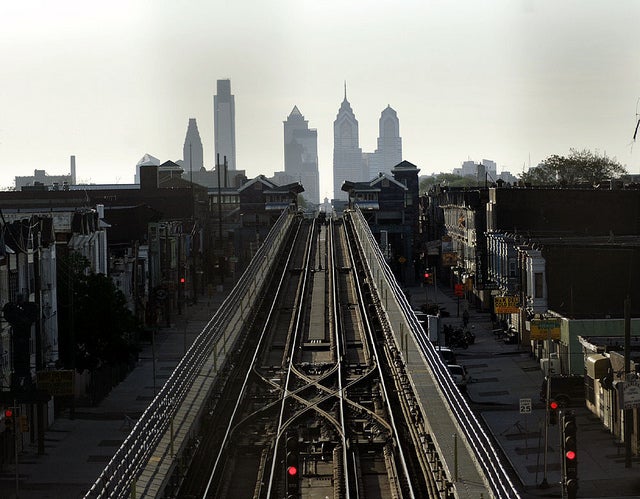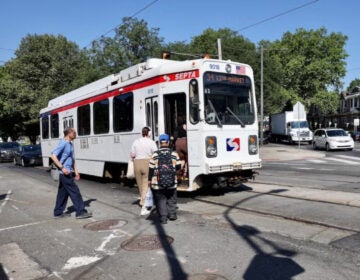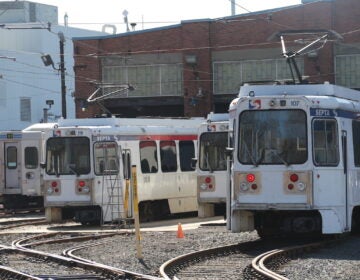SEPTA updates City Council on lease negotiations

Since a resolution authorizing hearings on SEPTA’s lease agreement with the City was passed by City Council early last month, the two parties have begun working more closely and have drawn nearer to an agreement, according to Councilman Wilson Goode, Jr., the sponsor of the resolution.
The City and SEPTA have made several attempts to settle on a new lease over the last several years. The currently operative lease-leaseback agreement, which was the subject of PlanPhilly coverage last month, was signed in 1968.
“[The resolution] brought things to light and may have helped us to speed up the process a bit,” said Goode.
Goode said that Council may choose not to set hearings at all, depending on the timeline of the negotiations and how quickly they can conclude, a question which is still unanswered.
In a letter he sent to Councilman Goode late last month, SETPA general manager Joe Casey laid out the terms under negotiation and the status of the talks.
“Negotiations are progressing,” the outline said. “The parties have worked through, and conceptually agree upon, several of the major issues that have previously stalled discussions.”
The goal of the negotiations, according to the letter, is “To craft an agreement that provides the City and SEPTA the ability to work cooperatively and equitably to maximize each other’s assets so as to maintain, enhance, and improve the transit system, without affecting transit fares.”
The outline of the negotiations reports that the term of the lease is likely to be 30 years, and that it will include all City transit properties leased under the original agreement, plus the City’s ownership interest in Rolling Stock, and the three “Transit Concourse Areas” at Suburban Station, Market East, and South Broad Street.
According to the outline, the City has asked SEPTA to share a portion of any revenue it gets from advertising or fiber optic on City owned property. Additionally, SEPTA will assume the maintenance costs for the Concourse Areas, which were previously covered by the City. It has asked that revenue from advertising or fiber optic on City property first go to covering those maintenance costs, and that the City receive a portion of the remainder.
SEPTA also will commit to making Concourse improvements, though the “timing, scope, and location of the concourse improvements are under negotiation,” according to the letter.
The outline also alludes to a survey the parties are conducting of the Suburban Concourse Area to resolve questions of ownership of commercial space. The letter says that the “preliminary results” of the survey suggest that SEPTA has leased City-owned space to commercial tenants. It proposes paying a portion of the revenue it receives from commercial tenants on City-owned property back to the City. As in the case of the advertising provision, SEPTA proposes that such revenue go first to maintenance costs for the Concourse Areas.
Finally, the letter includes a brief report on SEPTA’s finances, showing the cost to operate and passenger revenue for City-owned and SEPTA-owned assets.
In 2011, SEPTA operated the City-owned assets at a $144.3 million deficit, in terms of money it made back from passenger revenue. It operated its own assets at a deficit of $341.3 million. In total, there was a gap of nearly $700 million between SEPTA’s total operating cost and its passenger revenue. Almost 80 percent of that gap was made up for by the state, with federal and Philadelphia subsidies of just under ten percent each. The surrounding counties subsidized 2.5 percent of the deficit.
That’s good for a “recovery ratio” of 42.5 percent, which is five percent better than the ratio reported in a comparative analysis produced by Councilman Goode’s office in 2001.
Representatives of the Mayor’s Office of Transportation and Utility declined to comment on the negotiations, as they are ongoing. Andrew Stober, the Office’s chief of staff, said simply that the parties were “making good progress.”
SEPTA did not immediately return a call seeking comment.
Councilman Goode said that he is heartened by the progress in the negotiations. He said he hoped the hearings Council authorized last month would become unnecessary, but that he plans to continue emphasize to both parties that Council will ultimately have to approve a new lease.
More details on the lease negotiations will be reported here as they become available.
Contact the reporter at jaredbrey@gmail.com and follow him on Twitter @jaredbrey
WHYY is your source for fact-based, in-depth journalism and information. As a nonprofit organization, we rely on financial support from readers like you. Please give today.





